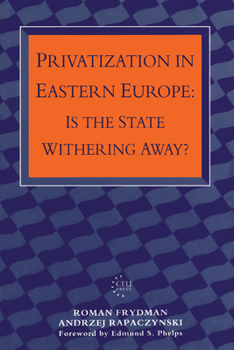Privatization in Eastern Europe: Is the State Withering Away?
In Eastern Europe privatization is now a mass phenomenon. The authors propose a model of it by means of an illustration from the example of Poland, which envisages the free provision of shares in formerly public undertakings to employees and consumers, and the provision of corporate finance from foreign intermediaries. One danger that emerges is that of bureaucratization. On the broader canvas, mass privatization implies the reform of the whole system, the creation of a suitable economic infrastructure for a market economy and the institutions of corporate governance. The authors point out the need for a delicate balance between evolution - which may be too slow - and design - which brings the risk of more government involvement than it is able to manage. A chapter originating as a European Bank working paper explores the banking implications of setting up a totally new financial sector with interlocking classes of assets. The economic effects merge into politics as the role of the state is investigated. Teachers and graduate students of public/private sector economies, East European affairs; advisers to bankers or commercial companies with Eastern European interests.
Format:Hardcover
Language:English
ISBN:1858660041
ISBN13:9781858660042
Release Date:January 1994
Publisher:Central European University Press
Length:240 Pages
Weight:0.85 lbs.
Dimensions:0.6" x 6.0" x 9.0"
Grade Range:Postsecondary and higher
Customer Reviews
0 rating





